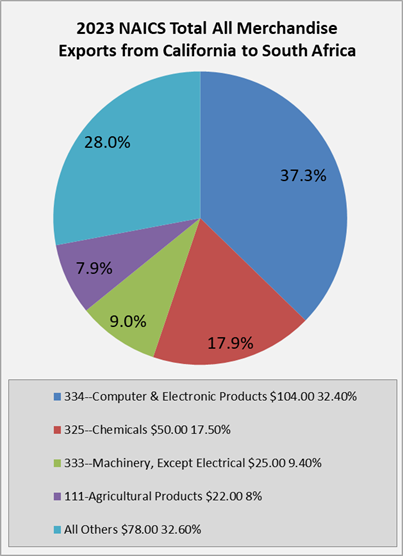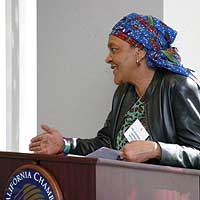Trading Partner Portal: South Africa
Overview
South African Business 2025 Edition
Global Africa Network, South African Business
Trade Overview
 Over the past three decades, South Africa’s post-apartheid government has made remarkable progress. South Africa is the second or third largest economy in Africa, in competition with Egypt. Their GDP totaled $400.26 billion in 2024. Their peaceful transition to democracy, priorities given to economic growth and dedication to human rights allowed South Africa to host the 2010 FIFA World Cup, which solidified their place on the world stage. Current population is 64.01 million people with an annual growth of roughly 1.2%.
Over the past three decades, South Africa’s post-apartheid government has made remarkable progress. South Africa is the second or third largest economy in Africa, in competition with Egypt. Their GDP totaled $400.26 billion in 2024. Their peaceful transition to democracy, priorities given to economic growth and dedication to human rights allowed South Africa to host the 2010 FIFA World Cup, which solidified their place on the world stage. Current population is 64.01 million people with an annual growth of roughly 1.2%.
(U.S. Department of State and World Trade Organization)
U.S. – South Africa Trade
South Africa is the 43rd largest export destination with the United States, with exports more than doubling over the past decade.
In 2024, two-way trade between South Africa and the United States was approximately $20.51 billion. The United States exported $5.82 billion to South Africa, of which $1.12 billion was made up of transportation equipment. This was followed by non-electrical machinery ($967 million), chemicals ($770 million), oil and gas ($657 million), and computer and electronic products ($543 million).
In 2024, the United States imported $14.69 billion from South Africa, $8.38 billion of that being primary metals. Other top imports included transportation equipment ($2.41 billion), miscellaneous manufactures ($1.42 billion), chemicals ($607 million), and non-electrical machinery ($259 million).
California – South Africa Trade

California exported over $306 million to South Africa in 2024, with computers and electronic equipment accounting for $129 million of this total. This was followed by chemicals ($50 million), non-electrical machinery ($29 million), transportation equipment ($29 million), and agricultural products ($20 million). U.S. Department of Commerce
This same year, California imported $983 million in imports from South Africa, with transportation equipment being the top category at $638 million. This was followed by miscellaneous manufactures ($110 million), primary metals manufactures ($42 million), computer and electronic products ($40 million), and processed foods ($36 million).
FDI – South Africa
According to the most recent figures, South Africa invested $5.41 billion into the United States economy. In 2024, the United States invested $7.04 billion into South Africa, an over 9% increase from 2023.
South African FDI in the U.S. contributed to 6,700 jobs, contributed $51 million in research and development, and contributed $1.1 billion to expanding U.S. exports. The top industry sectors for South African FDI were software and IT services, financial services, business services, paper & packaging, transportation, and auto components. Bureau of Economic Analysis, Select USA
More Articles:
Economist South Africa Country Report
Invest in South Africa
Investing in South Africa 2010
Projects in Progress 2009
South Africa Geared for Growth 2009
Information Provided by the South African Consulate General in Los Angeles
Trade Agreement / AGOA
| U.S. Strategy Toward Sub-Saharan Africa White House, August 2022 FACT SHEET: Vital Partners, Shared Priorities: The Biden Administration’s Sub-Saharan Africa Strategy U.S. Department of State, August 8, 2022 U.S. Food Security Assistance to Sub-Saharan Africa Statement by President Biden on the U.S.-Africa Leaders Summit |
U.S. Southern Africa Customs Union (U.S. – SACU) / African Growth & Opportunity Act (AGOA)
On November 4, 2002, the U.S. Trade Representative notified Congress of President Bush’s decision to negotiate a Free Trade Agreement with the member countries of the Southern African Customs Union (SACU). The five nations of the Southern Africa Customs Union are South Africa, Botswana, Namibia, Lesotho and Swaziland. Total U.S.-SACU trade totaled $17 billion in 2013.
A U.S.-SACU Free Trade Agreement would have built on the African Growth and Opportunity Act (AGOA) of 2000. The California Chamber of Commerce supported the AGOA, which President Bill Clinton signed on May 19, 2000 as part of The Trade and Development Act of 2000.
For more information, please see U.S. – Southern African Customs Union Free Trade Agreement
The African Growth and Opportunity Act (AGOA), extended to 2015, initially was enacted in 2000, eliminating duties on imports from African nations into the United States if those nations made significant efforts to open their economies.
Since its inception, AGOA has helped increase U.S. two-way trade with sub-Saharan Africa. In 2013, U.S. exports with the AGOA nations totaled over $22.8 billion, more than triple the amount in 2001. U.S. total imports from sub-Saharan Africa nearly doubled during this period to $38.1 billion.
U.S. Trade Representative Michael Froman stressed the need to renew AGOA beyond 2015 and said:
“Behind the billions of dollars in exports generated by AGOA, are hundreds of thousands of new jobs that have helped African men and especially women to support their families in ways that once seemed impossible. Countless African workers whose jobs depend on AGOA are now able to purchase goods and services that were previously beyond their means…By providing new market opportunities for African exports, especially of non-traditional and value-added products, AGOA has helped African firms become more competitive both in the United States and internationally.”
President Signs CalChamber-Supported Trade Bills
June 30, 2015
Statement by Ambassador Michael Froman on Congressional Passage of TPA
June 25, 2015
Presidential Proclamation – African Growth and Opportunity Act
December 2013
For more information, please see
U.S. Department of State
International Trade Administration
U.S. Trade Representitive
Brookings Institute – July 2013
U.S. Strategy
U.S. Strategy Toward Sub-Saharan Africa
In June 2012, Obama announced the new U.S. Strategy toward Sub-Saharan Africa with four main objectives:
(1.) strengthen democratic institutions
(2.) spur economic growth, trade and investment
(3) advance peace and security
(4) promote opportunity and development
This strategy emphasizes U.S. support for sustainable economic growth and prosperity in Africa.
Power Africa Initiative
Currently, over two-thirds of the population of 800 million people in sub-Saharan Africa has no access to power or electricity. The Power Africa Initiative was launched in June 2013 to double access to electricity in sub-Saharan Africa and provide more than 10,000 megawatts of electricity generation capacity that is cleaner and more efficient.
The U.S. government has committed to providing over $7 billion in aid and loan guarantees over a five-year period. Twelve U.S. government agencies including the U.S. Export-Import Bank (EX-IM), the Overseas Private Investment Corporation (OPIC) and the U.S. Trade and Development Agency (USTDA) are combining efforts to provide funding and technical assistance to the initiative.
Trade Mission / Events
Trade Mission to South Africa – 1995
The California Trade and Commerce Agency and the California Chamber of Commerce led a 20-member trade and investment mission to South Africa during the first week of October, 1995, to coincide with the Made in USA Trade Expo in Johannesburg, and with the opening of the California Office of Trade and Investment in Johannesburg.
The trip was a high-profile opportunity for California to introduce the state, its projects and way of doing business. Since the trade mission in 1995, U.S. exports to South Africa have nearly doubled.
For more articles and photos from the trade mission, please see the
October 20, 1995 Alert edition.
Trade Mission / Events
Visit from South African Consul Shares Sister State Ties and Push for Economic Development
(CalChamber, September 28, 2018) Renewing and furthering South Africa’s trade and investment relationship with California was the emphasis when Consul Talifhani Mbelengwa from the Consulate General of South Africa in Los Angeles stopped by the California Chamber of Commerce this week.
The South African Consulate General in Los Angeles represents the 13 western states of the United States. South Africa has four consular offices in the United States, including the embassy in Washington, D.C.
Consul Mbelengwa’s September 26 visit was pleasant and informative as he discussed the current activities and goals of new South African President Cyril Ramaphosa, who was elected in February.
CalChamber Hosts Consul General of South Africa

(February 24, 2014) Growing trade and investment between California and South Africa was a topic of discussion earlier this month when the California Chamber of Commerce hosted The Honorable Cyril Sibusiso Ndaba, consul general of South Africa in Los Angeles.
In the last five years, two-way trade between California and South Africa, the largest economy in Africa, has nearly doubled, from $684 million in 2009 to approximately $1.1 billion in 2013.
Joining the discussion with the consul general were Ms. Ezilda Samoville, executive director of the Senate Office of International Relations, and Mrs.Susanne Stirling, CalChamber vice president of international affairs.
Ndaba has served as the consul general in Los Angeles since 2010. He represents South Africa in 13 U.S. states—Alaska, Arizona, California, Colorado, Hawaii, Idaho, Montana, Nevada, New Mexico, Oregon, Utah, Washington and Wyoming.
He was the deputy high commissioner to the United Kingdom from 2004 to 2010. Before working in Rwanda for four years, Ndaba served as a diplomat in New York from 1995 to 1998.
One of the key strategic goals for the South African Consulate General in Los Angeles is “to stimulate South Africa’s economic growth through trade and investment promotion.” With a growing gross domestic product (GDP) of $384.3 billion, South Africa is well-positioned for foreign investment
South African Ambassador Highlights Country’s Growth

(March 24, 2004) South Africa’s continual strong economic growth is due in large part to international investment in the last decade of democracy, Ambassador Barbara Masekala told a California Chamber luncheon audience.
Masekala noted that in the last 10 years she has seen great economic achievements in South Africa due to strong trade partnerships and investment of the international community.